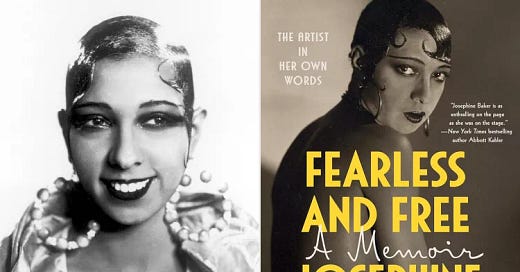Black Feminist Book Club #4: Fearless and Free by Josephine Baker
A peek into the life and legacy of a Black and queer icon.
As a Black queer woman, there are many Black queer icons I find myself discovering as I get older. Sometimes these discoveries stem from the fact that queerness is often situated as secondary to gender or race identity. But, for those of us who are multiply-marginalized, whose identities sit at multiple margins simultaneously, there are no aspects of our identities which we can simply file away or disregard on a whim.
Perhaps that is why Baker’s memoir/biography is so interesting and powerful. Baker never strove to water down her interlocking identities, her fullness, and her talents to make others feel comfortable. Their discomfort was never her problem and she knew it.
Baker’s memoir was first published in 1949 but is only just now being released in the United States. The memoir is fashioned in a non-traditional way in that it is comprised of interviews, stories, narratives, and accounts that were recorded by journalist Marcel Sauvage, beginning in 1926 and continuing through 1949. Thus, the memoir challenges the genre in it's form and does not seek to follow a comprehensive narrative. While this format may be susceptible to some embellishment from Sauvage, it is clear that Baker’s realness, authenticity, and bold personality could never be watered down or minimized.
The book begins with a discussion of the American South, where Baker was born. She notes that she was born along the Mississippi River on the St. Louis side. She calls St. Louis “a cold city” and says that, being born there made her want to dance. She “danced to keep warm” (27). While she was likely being hyperbolic, Baker was always consistent about the fact that, even though she was born and raised in the South, she yearned to be somewhere different. When the US began engaging in harmful segregationist and lynching practices, Baker decried these “race policies,” and compared them to Nazi Germany. Importantly, the text also highlights many problematic ideas Baker held about Jewish people. In her lifetime, Baker worked to explain her complicated feelings about this ethnic group but many still note that her stances would be considered antisemitic.
In the text, Baker discusses her experiences with racism and consumption across the globe. She notes that in countries like Hungary and Germany, she often felt welcomed, cherished, and valued. While in many other countries, she was called “the Black Demon” and often confronted with protests and Ku Klux Klan gatherings upon her arrival. While on her grand international tour, Baker found that she was often hyper-sexualized and diminished by onlookers because of her unique dance style and the color of her skin. Yet, foreign leaders were enamored with her, asking for private performances among the elites, and promising her royal treatment if she would simply visit their country. Despite her worldliness, it seemed that France always felt the most like home for Baker.
Two things many people do not know about Baker:
As World War II kicked up, Baker found herself working as a spy for the French resistance. Revealing her intellect and strategy, Baker was called upon to monitor and report on the movement of German soldiers during the conflict.
A deeply loving person, Baker adopted 12 children whom she referred to as the “Rainbow Tribe,” and was known to have monkeys, rabbits, cats, and many exotic animals in her possession.
In all, Baker was a deeply flawed and complex figure whose life achievements were always framed and shaped by the pressures of racism and sexism. She was keenly aware of these challenges and, rather than shying away from the limelight, ran straight toward it.
Next month’s book will be We Do This ‘Til We Free Us by Mariame Kaba.
Keep reading with a 7-day free trial
Subscribe to Love Notes to keep reading this post and get 7 days of free access to the full post archives.




